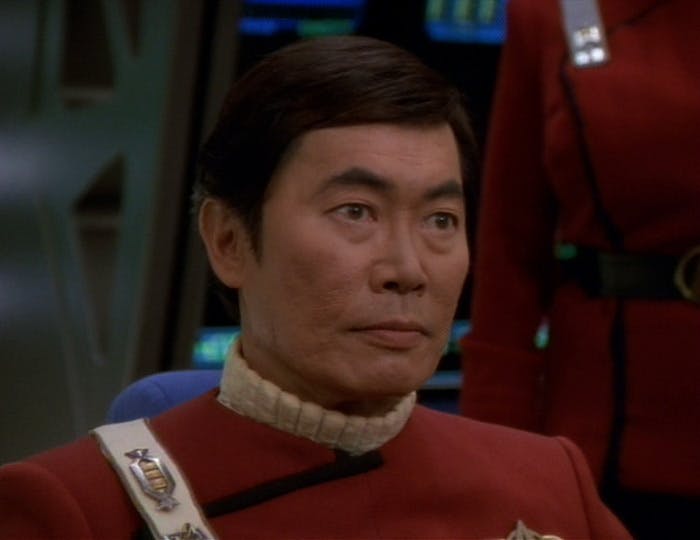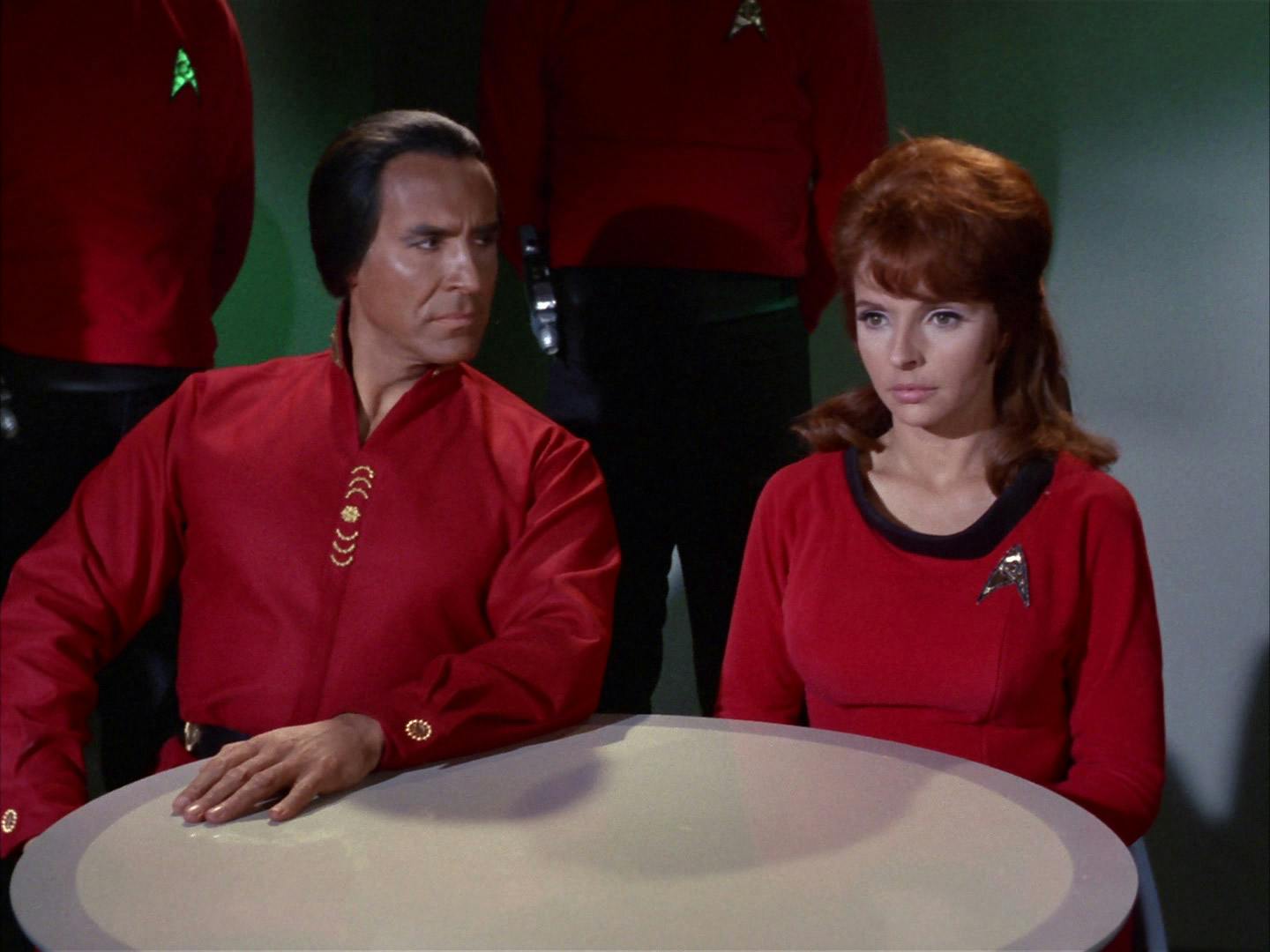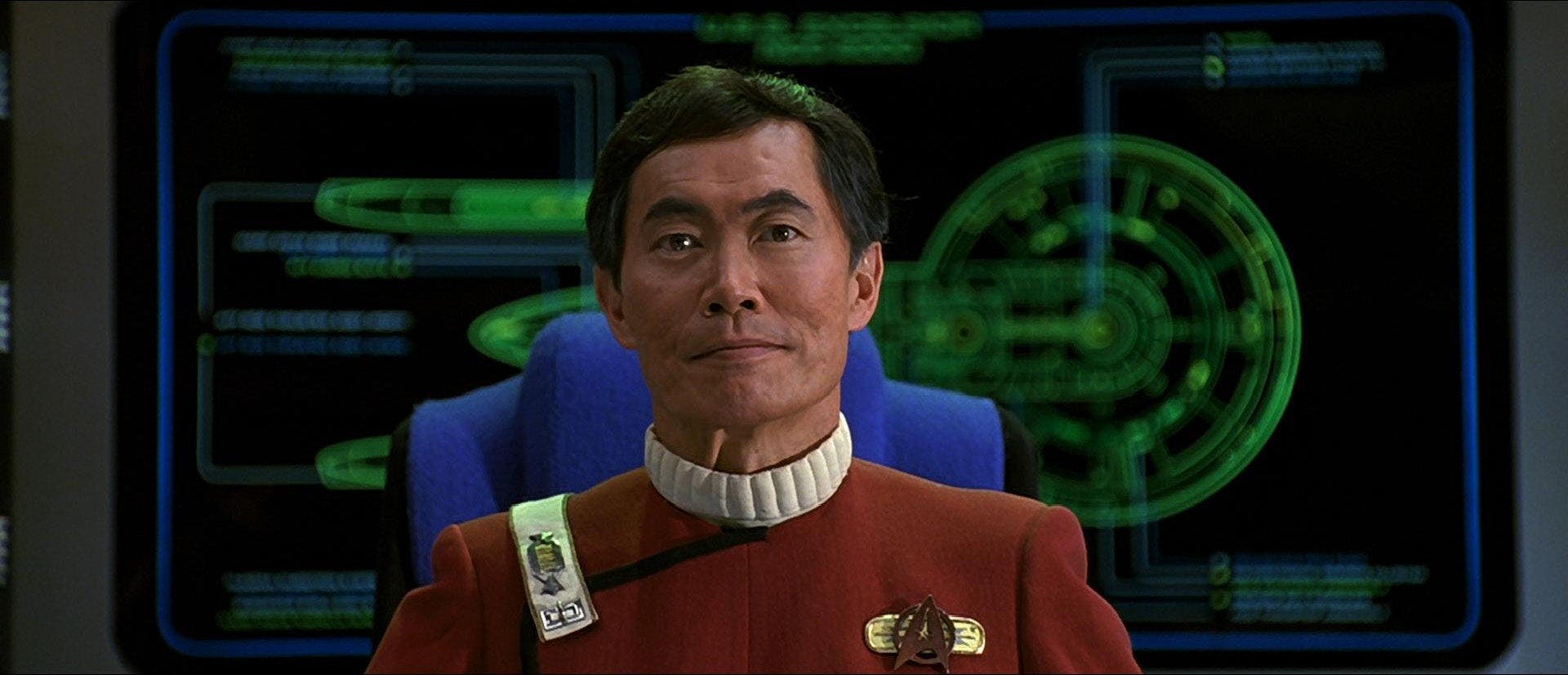Published Oct 27, 2025
WARP FIVE: George Takei on Sulu's Legacy, Leadership, and the Lingering Wrath of Khan
The legendary actor remains a beacon of the franchise's enduring spirit.

Edward Pomykaj / StarTrek.com
Welcome to Warp Five, StarTrek.com's five question post-mortem with your favorite featured talent from the latest Star Trek episodes.
With Star Trek: Khan, fans were treated to the return of Star Trek legend George Takei as he once again steps into the role of as the original scripted audio series explores the untold events on Ceti Alpha V, chronicling Khan Noonien Singh's descent from superhuman visionary as seen Star Trek's "" into the vengeful villain seen in .
StarTrek.com had the opportunity to sit down with George Takei on Hikaru Sulu's evolution, the enduring menace of Khan, and how life experiences shape his understanding of pain, power, and purpose.
On Sulu's Leadership

"Flashback"
StarTrek.com
In Star Trek: Khan's "Paradise," Captain Sulu faces off with new character Dr. Rosalind Lear, a brilliant and confrontational historian, who petitions Starfleet to escort her to Ceti Alpha V to recover historical logs by Marla McGivers, Khan, and his followers.
In their scene, Dr. Lear's intellectual aggression is displayed in sharp contrast to Sulu's calm, measured demeanor, demonstrating his evolution and growth from the Enterprise helmsman as seen in The Original Series to this point in his career in Khan.
"[Dr. Lear] is an intellectual warrior," describes Takei on their characters' dynamic. "She comes to talk to me and immediately sets her position, a very adversarial position. I welcome her civilly, invite her to sit, and immediately she's challenging what [Starfleet is] doing. She's brilliant... unrelenting and fierce."
"I don't agree with her at all, but I have respect for her as an academic and I know my position," Takei explains. "I question her purpose, to what end is she spending all her intellectual energies and force. It becomes a fencing match, a well-matched adversary."
A Villain Forged by Charisma

"Space Seed"
StarTrek.com
Takei credits Ricardo Montalban's unforgettable portrayal of Khan Noonien Singh for elevating the character into one of the Star Trek franchise's most iconic antagonist.
"The character of Khan, to a large extent, was created by this charismatic actor, Ricardo Montalban," says Takei, "who brought so much of his actor's imagination and his physicality that Khan became a singular menace. One of the best antagonists we've had on Star Trek."
"Montalban made the character as fiercely determined, unrelenting, and as frightening and as monstrous as he was in Star Trek, both the TV episode and the feature film."
Star Trek II: The Wrath of Khan is a film that continues to resonate with fans four decades later, and whose story is expanded on in Star Trek: Khan's audio series with actor Naveen Andrews' performance as the leader of the Augments.
Pain Passed Down
In "Paradise," Sulu addresses Dr. Lear and the Starfleet Civilian Resource Committee that he is "one of the very few still living who knew Khan personally," as he was present when Khan attempted to steal the U.S.S. Enterprise and kill Captain James T. Kirk.
Then, in "Imagination's Limits," aboard the U.S.S. Excelsior, Sulu questions Dr. Lear's determination to learn the account of the "monster" that is Khan, stating, "Pain that is not processed is passed on. And it is pain that creates monsters."
In a deeply emotional reflection with StarTrek.com, Takei connects Star Trek: Khan's central theme to his own personal experience as a Japanese American interned during World War II and real-world injustices.
"My parents' generation suffered the most," Takei recalls. "We were imprisoned without trial, without evidence. That pain shaped who I am."
Noting his time as an activist in the Civil Rights Movement and the peace movement during the Vietnam War, Takei's personal accounts adds profound weight to the audio series' exploration of trauma, memory, and justice, reinforcing that Star Trek has always been about more than space battles.
On Tuvok and Vulcans

"Flashback"
StarTrek.com
Star Trek: Khan showcases more of Captain Sulu and Ensign Tuvok's working relationship, in addition to Tim Russ' return to his character Tuvok.
"Tuvok is an unusual Vulcan," describes Takei. "He's a member of Starfleet so he's one of the most brightest, most competent, with a great sense of responsibility and terrific Vulcan rationale."
In "The Good of All," Tuvok reports to Captain Sulu that, although his acquaintance with Dr. Lear has been brief, he "feels" admiration for her impressive perseverance.
Speaking on that exchange in the audio series' sixth episode, Takei notes, "I occasionally see the human part of Tuvok appearing like when he says that he feel such and such about a situation. I catch that; it's 'Oh, you're supposed to be Vulcan and you're not quite behaving as Vulcans are supposed to.'"
"But in many ways, the rest of our society has a stereotype image of Vulcans," continues Takei. "Vulcans are supposed to be humorless, and we accept that as who they are. We are not evolved. We can't see the possibility that Vulcans can also feel in this script."
In the episode, despite stating that he'll surveil the historian's findings, Tuvok tells Dr. Lear that he believes his captain's concerns are either "unfounded" or "grounded in emotional response," and would like to see her research into Khan Noonien Singh to completion.
Takei is amused by Khan's nuanced depiction of Tuvok as an "un-Vulcan Vulcan," much like the character Spock, which adds depth to the character and challenges fans to rethink Vulcan identity. "In this script, we see something more complex."
A Reflection on Sulu and Star Trek

Star Trek VI: The Undiscovered Country
As we near the franchise's 60th anniversary, Takei expresses, "Every new landmark of Star Trek's longevity amazes me."
Recalling the "heartbreaking" moment the original series was canceled, Takei shares, "The next day, I went to the beach and I saw us in the larger universe, this great strength of this force making the waves come in and out. I ran along the beach all by myself just to burn up energy Star Trek was all over in my mind."
However, Takei credits this initial perception of the franchise leading local stations to air the series five nights a week because it was deemed "cheap," that led to "the audience [finding] us" and "the ratings exploded."
"Ten years after we were canceled, a major feature film was made," says Takei. "We thought that's great, terrific. That's a wonderful kind of punctuation there. We never expected it to become a series of feature films. So every aspect of this, and the 60th anniversary coming up, I'm stunned. It's always been a surprise, and now I am expecting more of the unpredicted, hope for surprises. What's next?"
Takei states, "I'm an activist for social causes, but I'm also an activist for my career," believing there is so much more to Sulu's story. He reveals that its his lobbying efforts during the original series and the films that led to Sulu finally becoming captain on the U.S.S. Excelsior in . It was a pivotal meeting with Harve Bennett and Nicholas Meyer that helped bring this Starfleet career development to life shaping Sulu's arc, concluding, "My George Takei activism paid off."




